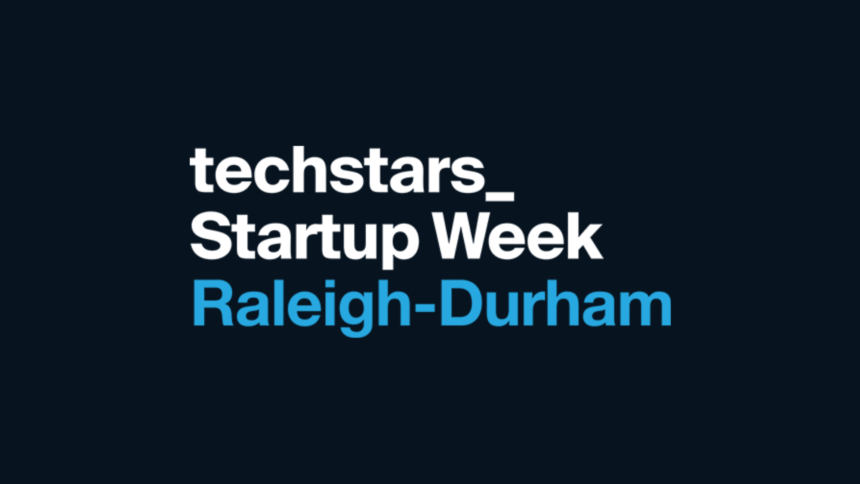Lovely weather and networking awaited attendees on day two of Raleigh-Durham Startup Week (RDSW). The event continued Wednesday, with attendees on the streets of Durham migrating between the American Underground and the American Tobacco Campus.
Lauren McCullough speaks about early adopters in the Startup 101 track Wednesday afternoon. (Photo by Jen McFarland)
Legal, Finance, & Startup Tips
The morning included open office hours with attorneys and accountants on-hand to answer startup questions. That expertise carried through the day during the “Legal & Finance” track featuring sessions on trademark, IP, and brand protection, as well as guidance for navigating the legalities of co-founding a business.
The “Startup 101” track began with a conversation about building your team, with insights from David Spratte and Kasper Kubica, co-founders of Carpe. After that growth expert Lauren McCullough, cofounder of Trommel and Auroraflow, took the stage to cover tips on identifying and targeting your business’s early adopters.
McCullough spoke from a starting point of knowing your customer and understanding their problems. But the ones who are your early adopters, she said, are those who have experienced those problems most acutely. Those experiences will inform how successfully your product or service solves their problems, and those first customers will be invested in your success since the problem is a serious pain point for them.
“They should have scar tissue,” said McCullough.
The Startup track concluded for the day with a panel discussion on early investment funding and a chat with Osahon Ojeaga, founder of Aja Labs.
Tech & Society Teaches Tactics
The Tech & Society track opened on a biodiversity conversation featuring Max Rünzel of HiveTrack, Greg Robinson of Aston Labs, and Brewer Logan of Verenovo Energy.
From there, Perry White of the Center for Advanced Hindsight spoke about using Behavioral Science to predict and direct user experiences.
White directed founders to reconsider designing for outcomes and instead focus on the customer’s experience and actions.
“If you understand well, what people intended to do, there’s no reason for you to give them so many options that they might not do that,” explained White. “You can give people the freedom of choice, but you design the system for the outcome that you expect that they actually wanted.”
Anticipating your user’s needs can also let a startup provide support and insight in moments of indecision or stress. When there are too many options, your customer may give up, but the right insights and support delivered at the right time can make all the difference.

Dr. Chris Monroe talks quantum computing with Krista Covey. (Photo by Jen McFarland)
Quantum Conversations
The Tech & Society track wrapped up with a Fireside Chat on Quantum Computing with Dr. Chris Monroe, a professor at Duke and the University of Maryland, and the Chief Scientist at IonQ. The conversation was moderated by Krista Covey of First Flight Venture Center.
Dr. Monroe gave an intro to quantum computing by explaining that there are basically two rules. First, that objects can exist in two places at the same time as two realities. And second, that the object only exists in two places as long as no one is looking.
Sound confusing? It is! It’s inherent to the system. The ability to exist in multiple states increases the binary attributes of a traditional computer, allowing for infinitely larger storage and computing potential. But don’t worry if this doesn’t make sense.
“Einstein never accepted quantum because it was so strange,” acknowledged Monroe. “So if he was confused by the rest of us shouldn’t worry.”
Wrap-up today in Raleigh
Raleigh-Durham Startup Week travels to Raleigh tomorrow for the final day of sessions and an evening event at Pendo. The evening will include a Fireside chat with RDSW co-chair Chris Heivly discussing his new book, Build the Fort: The Startup Community Builder’s Field Guide, due later this month.




